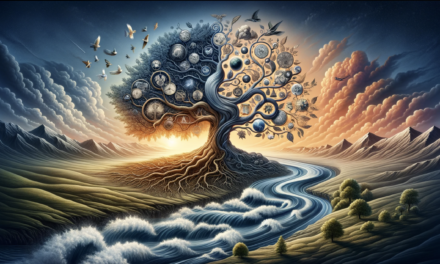‘The new Netflix film set viewing records, and now ‘viewers’ need to become ‘doers’.
On Christmas Eve in 2021, Netflix began streaming Don’t Look Up, a new science fiction film with a star-studded cast. It received mixed reviews from critics on both sides of the Atlantic, but it set a record for the most viewing hours in a single week on Netflix. Within 28 days of its release, it became the second most-watched film on Netflix.
I didn’t watch it until January and regardless of negative critic’s comments, I’ve found that I can’t stop thinking about it. I found the satire amusing, and enjoyed watching the many A-lister stars who seemed to be having fun hamming it up for all it was worth. More than that, I found the underlying message about the human predicament timely.
Although the film’s focus was a giant asteroid heading straight for the earth, the parallels with such impending disasters as climate change, biodiversity loss, and pollution are easy to draw. And as the satire of government, political and media indifference clearly showed, our species isn’t showing many signs of being very ‘sapient’ right now.
Much as I enjoyed the film, I couldn’t help thinking that it portrayed the big challenge facing humanity as a conflict between rational science and the current irrational, entertainment-mad, power-hungry, profit-crazed human culture. There is an element of truth in this, of course, or the film wouldn’t be so funny or popular. But in my view, although science brings many enormous benefits to our species, it is not, on its own, the means of improving humanity’s current predicament.
Science is without a doubt a potent avenue to certain kinds of truth, and it has enabled humanity to develop unimaginably powerful technology. But we need to augment it with at least three alternative pathways if we are to live up to the name of our species — wise people (homo sapiens). And those alternatives are philosophy, the arts (of which Don’t Look Up is itself an example) and something else that is very difficult to encapsulate in a single word.
You could call it ‘religion’, but that word has too many overtones of inflexible human-led institutions and irrational beliefs. ‘Theology’ implies ‘God’, which means so many different things to different people, and for non-believers sounds almost irrelevant to the modern world. ‘Spirituality’ can seem subjective and wishy-washy. But whatever name you give it, this aspect of experience remains a crucial part of the network of pathways essential to developing collective wisdom.
As it happens, when I watched Don’t Look Up, I had spent six weeks immersed in Iain McGilchrist’s magisterial new book, The Matter with Things. I was already familiar with his international bestseller The Master and His Emissary and the summary of its core theory in Ways of Attending. Iain is a neurobiologist and psychiatrist well qualified in philosophy and psychology. On his website, he describes himself as being ‘committed to the idea that the mind and brain can be understood only by seeing them in the broadest possible context, that of the whole of our physical and spiritual existence, and of the wider human culture in which they arise – the culture which helps to mould, and in turn is moulded by, our minds and brains.’ The culture, you could say, that Don’t Look Up lampoons.
Like Don’t Look Up, Iain McGilchrist is concerned with the state of humanity right now. In a message to followers followers on his website, McGilchrist writes, “I believe that we are engaged in committing suicide: intellectual suicide, moral suicide and physical suicide. If there is anything as important as stopping us poisoning our seas and destroying our forests, it is stopping us poisoning our minds and destroying our souls … Even if we could, by some miracle, reverse the course on which we are set, unless we changed our way of thinking and of being in the world – the way that is destroying us as we speak – it would all be in vain.”
But unlike the Netflix movie, The Matter with Things presents a scientific diagnosis of how we became embroiled in the present predicament. So, from 1500 closely reasoned pages, a reader can glimpse the scope of change necessary for homo sapiens to become a net contributor to a flourishing ‘earth community’ on ecologically stable planet earth. The analysis flows from recognising the part that each of our two brain hemispheres plays in how we focus our attention. As Iain McGilchrist puts it in Ways of Attending, “It is not what each hemisphere does – they are both involved in everything – but how it does it, that matters. And the prime difference between the brain hemispheres is the manner in which they attend. For reasons of survival, we need one hemisphere (in humans and many animals, the left) to pay narrow attention to detail, to grab hold of things we need, while the other, the right, keeps an eye out for everything else. The result is that one hemisphere is good at utilising the world, the other better at understanding it.”
In The Matter with Things, he considers how we respond to the significant challenges we all face today. He argues that “we have become enslaved to an account of things dominated by the brain’s left hemisphere, one that blinds us to an awe-inspiring reality that is all around us, had we but eyes to see it.” He suggests that “in order to understand ourselves and the world we need science and intuition, reason and imagination, not just one or two; that they are in any case far from being in conflict; and that the brain’s right hemisphere plays the most important part in each.”
And, as I suggested earlier in this article, that implies that such a change will need to include a re-balancing of science, philosophy, the arts and, dare I say it, spirituality.
Terry Cooke-Davies
January 2022







